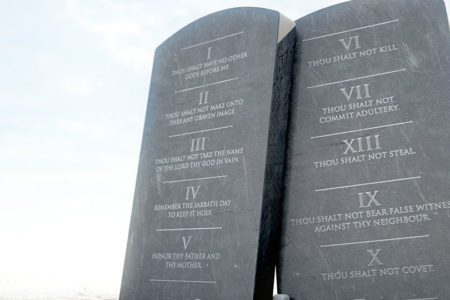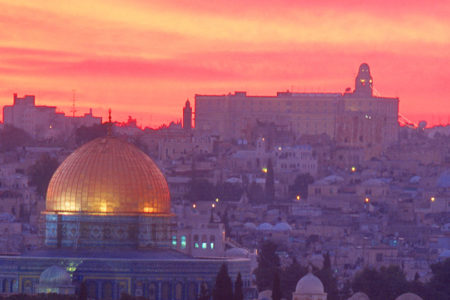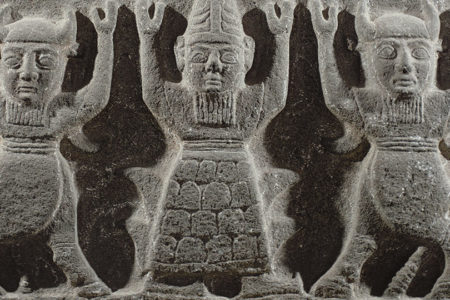The Grecian Conqueror
Zechariah 9:1–8
The six remaining chapters of Zechariah’s prophecy consist of events pertaining to God’s eschatological program for Israel. They cover a vast period that extends from the Grecian era under Alexander the Great to the yet future return of Israel’s Messiah. Some of the clearest, most abundant Messianic prophecies on the Lord’s First and Second Advents are revealed in Zechariah 9—14.
These six chapters separate into two divisions with the phrase the burden of the word of the Lᴏʀᴅ (9:1; 12:1). The first burden (oracle) reiterates Alexander’s historical conquest of the East and the appearing of Israel’s Messianic Shepherd (9:1—11:17). The second burden describes events surrounding Messiah’s Second Coming and His Kingdom rule as they relate to Israel’s restoration and redemption (12:1—14:21).
Theologians disagree on when Zechariah 9:1–8 was fulfilled. We will not compare views here. Most conservative scholars teach that the passage took place during the time of Alexander the Great.
Judgment Declared
God’s judgment of the nations surrounding Israel was inevitable:
The burden [oracle] of the word of the Lᴏʀᴅ against the land of Hadrach, and Damascus its resting place (For the eyes of men and all the tribes of Israel are on the Lᴏʀᴅ); also against Hamath, which borders on it, and against Tyre and Sidon, though they are very wise (vv. 1–2).
The word burden means “to lift up” or “to bear” and refers to something heavy and burdensome, such as this indictment from the Lord. Zechariah had to deliver the ominous message that God would pour out judgment on Israel’s neighbors.
To do so He would use Alexander the Great. Daniel had prophesied earlier that the Grecian Empire, like a winged leopard (Dan. 7:6) and strong he-goat (Dan. 8:5–7), would swiftly conquer Asia. With his army of 40,000, Alexander rapidly defeated the Persians at the Battle of Issus in 333 B.C. King darius escaped. But rather than pursue him, Alexander focused on attacking Phoenicia and Egypt.
Zechariah mentioned cities that Alexander conquered on his way to Egypt. Hadrach (v. 1) appears only here in Scripture. Scholars have interpreted the word in various ways: (1) symbolically and mystically; (2) as the name of an Assyrian king or fire-god; (3) as the name of a deity in Eastern Aramea; and (4) as a scribal error for Hauran, a district south of damascus connected with Hamath. We may safely identify Hadrach with Hatarikka, a city north of Hamath, mentioned in an Assyrian inscription as the opponent of Tiglath-pileser III who conquered it in 738 B.C.
Damascus (v. 1) was the capital of Aram (Syria), a strong enemy of Israel for many centuries. God’s wrath will “rest,” or settle, on Damascus first.
Hamath (v. 2) was an Aramean (Syrian) city north of damascus on the Orontes River. Tyre and Sidon (v. 2) were ancient Phoenician cities on the coastal plain, with the mountains of Lebanon on the east and the Mediterranean Sea on the west. All of these nations, including Israel, had their “eyes…on the Lᴏʀᴅ” (v. 1), or stood in awe at God’s judgment through Alexander the Great.
Verses 3 and 4 describe Tyre’s destruction. Tyre was an impregnable fortress that had grown rich through commerce. Silver there was as common as dust; and gold, as common as dirt—making the city self-sufficient (cf. Ezek. 28:4–5). Nevertheless, Tyre would not survive: “The Lᴏʀᴅ will cast her out; He will destroy her power in the sea” (v. 4).
Nebuchadnezzar besieged Tyre from 586–573 B.C. and eventually destroyed it. But many of the inhabitants escaped to a fortified island. Alexander scraped up the ruins of old Tyre and dumped the debris into the sea, enabling him to build a half-mile causeway so his army could attack the island. In 332 B.C. Alexander conquered the island city and burned it to the ground. The prophecies of Tyre’s destruction were fulfilled in every detail as Alexander annihilated this “power,” its riches, fleet of ships, commerce, and fortifications (cf. Ezek. 26—28).
Alexander the Great then traveled south to battle Egypt. As he advanced, he destroyed four of the five cities of Philistia: Ashkelon, Gaza, Ekron, and Ashdod (vv. 5–6). Gath was omitted from the list, since Judah had already destroyed it (2 Chr. 26:6).
Ashkelon feared attack, and rightfully so, for Alexander annihilated the city’s population (v. 5). Gaza anguished over the loss of its king, especially when Alexander replaced him with a Grecian governor (v. 5). Ekron had expected Tyre to come to its aid, but this was impossible since Alexander had already destroyed it. Ashdod would become a city of mixed nationalities after its destruction (v. 6).
With their demise, God eradicated the national pride and arrogance of these four Philistine cities and their idolatrous practices. God would “take away the blood from his mouth, and the abominations from between his teeth. But he who remains, even he shall be for our God, and shall be like a leader in Judah, and Ekron like a Jebusite” (v. 7). In other words, God would stop the practice of eating unclean animals (along with their blood) that had been sacrificed to idols. The people who survived ceased their idolatry and were absorbed into Israel. A similar absorption took place among the Jebusites after david defeated them and captured Zion.
Jerusalem Delivered
In contrast to these nations, Jerusalem would be spared. Humanly speaking, there is no good reason why Alexander should have spared Jerusalem. In fact, he was on his way to conquer the city. He had sent a messenger to Jerusalem requiring the tribute it paid to Persia be transferred to him, but the high priest refused to comply, not wanting to break his oath to Persia.
Jerusalem survived because God promised to protect the city from Alexander. Prophesying directly through Zechariah, the Lord said, “I will camp around My house because of [against or from] the army, because of [against] him who passes by and him who returns. No more shall an oppressor pass through them, for now I have seen with My eyes” (v. 8).
The words my house (v. 8) are a metonymy for the “land, Temple, and people of Israel.” In his conquest of the Middle East, Alexander’s marauding forces passed Jerusalem on the way to Egypt and returned via the same route without ever invading the city. Jerusalem’s deliverance can be attributed directly to God’s divine protection. The Lord promised to encamp around the city, and He did (2:5).
Ancient historian Flavius Josephus, in his Antiquities of the Jews (11.8.5–6), recorded how Jerusalem, humanly speaking, survived. As the story goes, Jaddua the high priest heard that Alexander was on his way. Overwhelmed with fear, Jaddua ordered the city to sacrifice and pray to God. That night Jaddua had a dream, which he believed was from the Lord. He dreamed that God instructed him to be courageous, decorate Jerusalem with wreaths, remove his priestly garments, and have the people dress in white. Then they were to march out of Jerusalem and welcome Alexander with open arms.
So Jaddua did just that. Josephus wrote that when Alexander saw the procession, he prostrated himself before the high priest. Alexander’s officers questioned whether he had gone insane. Alexander replied that he had seen this person in a dream, dressed as he was now, before beginning his conquest of Asia. In the dream, Alexander was told to conquer with confidence and take dominion of Persia.
Alexander was escorted to Jerusalem by Jaddua. There he went to the Temple, offered sacrifices, and was shown from the book of daniel that a Greek would swiftly destroy the Persian Empire. Alexander offered Jaddua whatever he desired. The high priest asked that Jerusalem be left to live in peace, abide by its own laws, and be exempt from paying tribute. Alexander granted the request.
Alexander the Great did visit Jerusalem during his conquest of the Middle East, but how much of Josephus’ account is fact and how much is legend is uncertain. What is certain is that God kept His promise to give Jerusalem divine protection, resulting in its survival against Alexander the Great.
Jerusalem’s Destiny
Verse 8 ends with this marvelous word from the Lord: “No more shall an oppressor [taskmaster or slave driver] pass through them, for now I have seen with My eyes.” In other words, God promises to watch over the Jewish people. His “eye” has seen Jerusalem’s distress and destruction throughout the centuries, and there will come a day when He will allow it no more. Unfortunately, that day has not yet arrived.
After Alexander’s death, Jerusalem suffered at the hands of many tyrants, especially the infamous Antiochus Epiphanes (Dan. 11:21–35). Antiochus was a Syrian king who desecrated the Temple by offering a pig on the altar (168 B.C.). Then he subjugated the people ruthlessly. Titus, a Roman general, destroyed both Jerusalem and Herod’s Temple in A.d. 70.
Jesus prophesied, “Jerusalem will be trampled by Gentiles until the times of the Gentiles are fulfilled” (Lk. 21:24). The “times of the Gentiles” began with King Nebuchadnezzar of Babylon and will end at the Second Coming of the Messiah when He reclaims the earth. Then Jerusalem’s oppression by the nations of the world will be terminated. This prophecy will ultimately come to fruition when the Messiah himself protects Israel in the Millennial Kingdom.
You might ask, “Why spend so much time on the conquest of Alexander the Great?” It is important to see how Alexander’s victory prepared the Near East for the Messiah’s First Coming. Alexander encouraged his soldiers to marry women in the areas he conquered and educated them in Greek law, language, and culture. Greek became the lingua franca of the Middle East. Romans spoke Greek as a second language. Eleven of the Lord’s disciples spent much of their lives near the Sea of Galilee, around which bordered the Greek cities of the decapolis. With Greek manuscripts in hand, the apostles spread the gospel of the Messiah to the farthest parts of a Greek-speaking world.
Thus we see another illustration of God’s sovereign hand organizing, orchestrating, and overruling in the course of history to prepare for the advent of the Messiah.







